 |
Overseas Offices in Beijing and Bangkok
In order to strengthen it's capacity for information gathering and transmission, Kyushu University opened two new offices in Beijing and Bangkok in April 2006, in addition to four overseas offices in London (UK), Silicon Valley, California (USA), Munich (Germany) and Seoul (Korea), which were opened in April 2004. The new offices act as hubs in China and Thailand to transmit information regarding Kyushu University to both countries. The offices also gather information from both countries and give advice concerning the activities of Kyushu University.
The following have been appointed new office managers.
Beijing Office (China)
Mr. Song Min
Senior Researcher
Institute of Agricultural Resources and Rural Regional Planning, Chinese Academy of Agricultural Science
Bangkok Office (Thailand)
Mr. Mitsuho Matsuo
Managing Director
Panasonic Motor (Thailand) Co., Ltd.
Opening Ceremony of Beijing Office
On April 14, in celebration of the new office, the Beijing Office held a grand opening ceremony inviting many people from exchange schools, the Beijing offices of Japanese Universities, and the Alumni Association of Kyushu University in China. The Beijing Office plays a leading role in supporting the cooperative research of Kyushu University in China, and the gathering and transmitting of academic information.
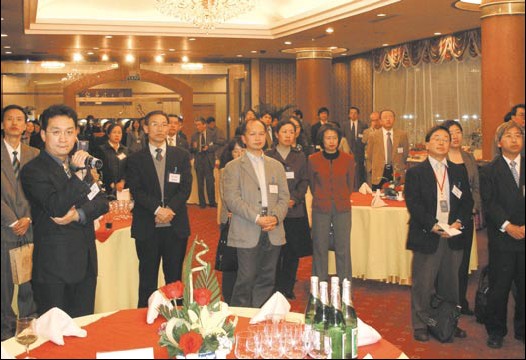 |
"International Symposium on Academic Cooperation between Japan and China" Held to Commemorate Opening of Beijing Office of Kyushu University
The International Symposium on Japan-China Academic Exchange was held at the Jade Palace Hotel in Beijing, China, on Friday, September 8, 2006, to commemorate the opening of the Beijing Office of Kyushu University. The Beijing Office was established in April 2006, marking the start of Kyushu University's activities in China. This symposium was the first of its kind to promote joint research between Japan and China, and enable Kyushu University to provide information on its academic studies and collect related information. Kyushu University
President Kajiyama, the vice president Yanagihara who is in charge of international exchanges, participated in the symposium as well as some 80 people, including international graduates from the university. President Kajiyama said, "I'm very proud that those who have studied at Kyushu University are playing leadership roles in China. I hope they will continue to use their talents and make the most of the Kyushu University network. Kyushu University will continue to send high-quality students out into the world, facilitated through the work of the Beijing Office."
Following the symposium, the second general meeting of the Kyushu University Alumni Association in China, was held to deepen mutual friendship. The Association consists mainly of those who have studied at Kyushu University.
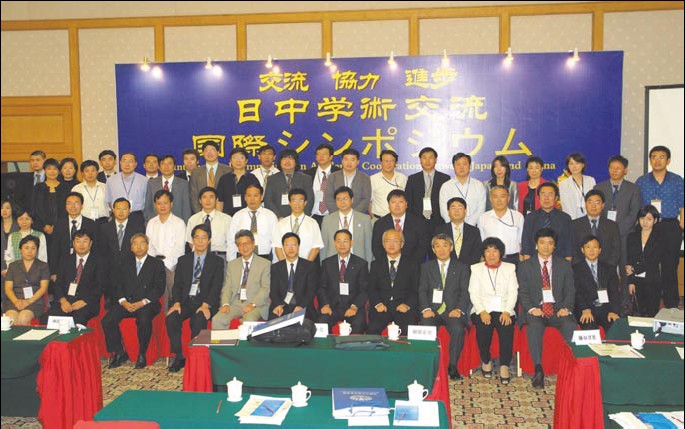 |
"Special Guest Professor" Nobuko Takagi soaked in Philippines
On Friday, March 10, the first SIA-DAY "Soaked in Philippines with Nobuko Takagi" was held at the Round Hall of Across Fukuoka.
SIA (Soaked in Asia) is a project being promoted by Nobuko Takagi, a novelist and special guest professor at Kyushu University's Asia Center. The project goal is "to capture and express contemporary Asia through five sences."
In this session, the short story "The Distance to Andromeda" by Philippine writer Gregorio Brillantes, a photo essay by professor Takagi on her visit to the Philippines to meet Mr. Brillantes, a novel by proffessor Takagi, "Ten no ana [Hole in the sky]," that was written as a response to "The Distance to Andromeda," and others works were introduced.
Philippine sweets and drink, souvenirs from the trip, were served during the break time.
The two interactive novels that were introduced appear together in a series in the literary magazine "Shincho." This project is scheduled to be held twice a year, and the next theme is "Vietnam."
Ms. Takagi shows her motivation to continue the project and to visit about 10 countries.
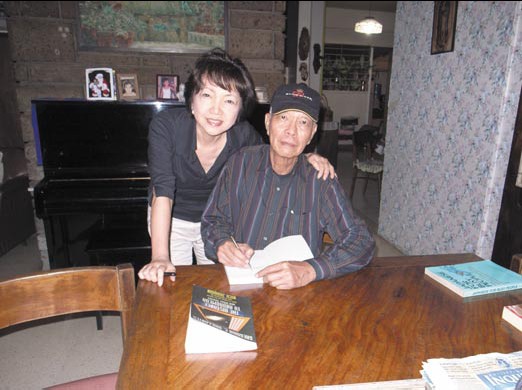 |
Feeling Vietnam with the Five Senses Nobuko Takagi Holds Second SIA-DAY
The Second SIA-DAY, Soaked in Vietnam with Nobuko Takagi, was held at the Round Hall of Acros Fukuoka on Saturday, September 30. "War and Love" was the theme of the event, and nearly 140 people participated.
At the Second SIA-Day, a vietnamese short story called "The Wind from Heaven," was read aloud. During Professor Takagi's visit to Vietnam, she had a dialogue with the Vietnamese writer, Chan Tou Mai. The event also included the photo essay by Professor Takagi based on her visit to Vietnam, and a short story, "The Jasmine Hotel," written by Professor Takagi in response to "The Wind from Heaven." During the recess, a snack time event, called "Oyatsu SIA," took place, with Vietnamese sweets and lotus tea served.
This event is held twice a year. The theme for the next event is Taiwan.
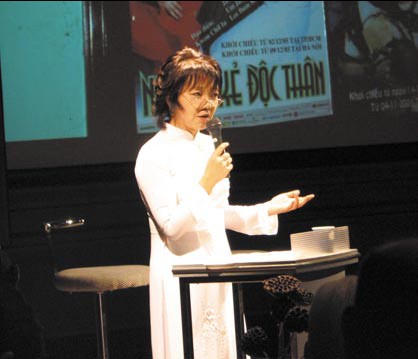 |
Disaster investigation on Java Earthquake
 |
In the early morning on Saturday, May 27, 2006, an earthquake of a magnitude of 6.3 occurred in mid Java Island, Indonesia, which caused severe damage including massive casualties and collapsed buildings in Yogyakarta City and the surrounding area.
Kyushu University opened a branch office at Gadjah Mada University in Yogyakarta City where the earthquake struck, and held a presentation meeting by the Kyushu University -Indonesia Alumni Association at Gadjah Mada University in May 2006.
Gadjah Mada University conducted investigations on the first break with their specialist groups in architecture, and geotechnology, in addition to sending many students to rescue the victims, and called for Kyushu University's support to cover their lack of experience in earthquake investigation. In response to their request, Kyushu University sent a research team twice, between June 6 - 11 and between June 20-26.
On Friday, July 14, a meeting was held to report the local situation and to make a prompt announcement on the results of the disaster investigation to the related parties and citizens.
Donations for the victims of Java Earthquake
On Tuesday, July 18, 2006, donations for the victims of the Java Earthquake that occurred in mid Java Island on May 27 were presented in the Administration Bureau office.
The donations were collected from faculties and students to support the victims and reconstruction, which amounted to 1,245,000 yen and was presented to the Kyushu University Alumni Association in Indonesia through the Association of Indonesian Students in Japan.
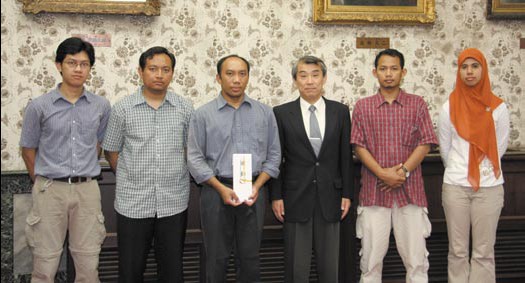 |
Consul-General Kim, Republic of Korea Received Doctorate
On Monday, September 25, 2006, Mr. Kim Yonso, consul- general for the Consulate-General of the Republic of Korea in Fukuoka, received a doctorate in a ceremony held at Kyushu University.
A total of 58 people from 11 academic institutions received their doctorates at the day's ceremony. President Kajiyama, representing the Graduate School of Bioresources and Bioenvironmental Science, awarded Consul-General Kim the doctorate.
After the ceremony, a smiling Consul-General Kim said, "I'm honored to receive this doctorate from Kyushu University, which continues to work closely with the Republic of Korea. I think my dissertation topic, agriculture and rice, will also be an important theme in Japan-ROK negotiations on the free trade agreement in the future. I wrote the paper in the hope of playing some role in this field. Having received the doctorate, I intend to further develop good relationships between the Republic of Korea and Japan."
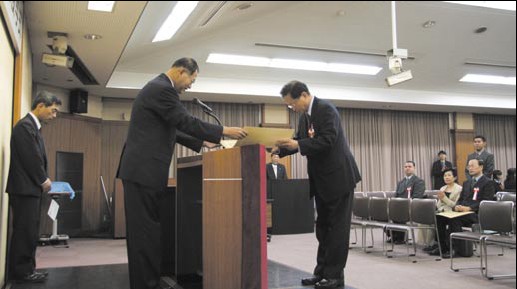 |
Former Prime Minister Lee, Republic of Korea - Appealed the importance of peace in East Asia
On Friday, July 7, 2006, a lecture presentation was given by former Prime Minister Lee Hai-chan, Republic of Korea, at Centennial Hall, Kyushu University School of Medicine. The lecture theme was "Present and Future of Korea-Japan Relation." "It takes about an hour to fly from Seoul to Fukuoka. I could actually feel the closeness between the two countries."
Former Prime Minister Lee spoke calmly about the expansion of cultural exchange in private sector, strong economic interdependency, and mentioned that barriers between Korea and Japan are virtually nonexistent due to television and Internet while the political relationship between the two countries has been damaged. Mr.Lee continued with the following comments:
"This is 21st century. History is progressing. There probably is a limit as a result from our history, but we should not be trapped in it, as the mature relationship between Korea and Japan has now marked its 40th year to create a better future through cooperation."
"The lesson of the Korean War is never to start a war in the Korean Peninsula and East Asia. Korea, Japan, and China have historical responsibilities to prevent a war."
"We should solve the issues concerning North Korea rationally with protection of peace in Asia in mind. Korea, the U.S., and Japan should cooperate to bring back North Korea to the six nation talks."
Lastly, Mr. Lee made an appeal to the students, "Please have dreams and develop the Korea-Japan relationship as our partner," and received applause from the students and people attending the lecture.
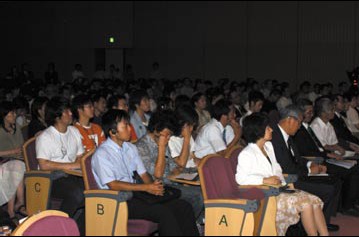 |
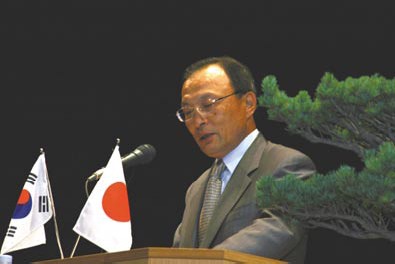 |
Professor Yoh Iwasa was elected as a foreign honorary member of the American Academy of Arts and Sciences
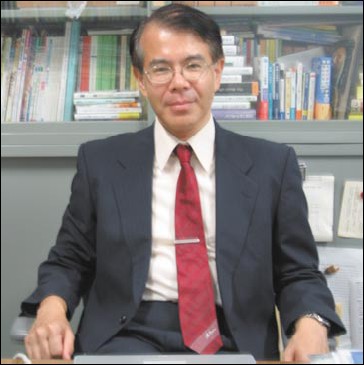 |
Professor Yoh Iwasa, Faculty of Sciences, was elected as a foreign honorary member of the American Academy of Arts and Sciences. The American Academy of Arts and Sciences was established in 1786, and being inducted as a member is considered the highest honor in the U.S., as it symbolizes the receiver's great influence on the time. On this occasion, 175 people were chosen to be new members, and 20 people were chosen to be new foreign honorary members, all of whom are active in academia, art, and public and private organizations.
Professor Yoh Iwasa specializes in mathematical biology and has worked on the analysis of biological phenomena based on optimal control theory and game theory that have been developed in the field of engineering and economics. In recent years, he has worked on advanced research that cover a wide range of topics from ecology such as forest dynamics, extinction risk of field organisms and cooperative activities by humans, to molecular biology such as pattern formation of organisms in developmental processes, evolution of genomic imprinting, and dynamics of cancer cells.
The selected members for this year include Mr. George H.W. Bush and Mr.William Jefferson Clinton, who have served as former Presidents of the U.S., and foreign honorary members in the past include Mr. Akito Arima (former President, The University of Tokyo) and Mr. Ryoji Noyori (President of RIKEN).
Professor Takashi Gojobori, National Institute of Genetics, was also elected as a foreign honorary member. Mr. Gojobori is a graduate of Kyushu University (received his PhD from Graduate School of Sciences, Kyushu University in 1979) and serves as a domestic specialist committee member in Kyushu University's 21COE project "Integrated Life Science."
Outstanding performance of "Kyushu University happi jacket" in Australia
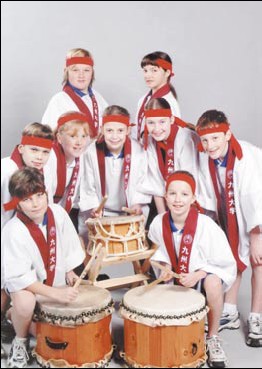 |
In commemoration of the opening of the Ito new Campus on October 1, 2005, various events with the theme of "Kyushu University Ito Campus Birth Year 2005" were held by Kyushu University, Organization for Promotion Academic City by Kyushu University, and neighboring municipalities. Kyushu University happi jackets were worn by all the staff that participated in the events. The happi jackets are drawing people's attention again in an unexpected place.
It is Warranwood Primary School in Melbourne, Australia. During the Japanese drumming concert held on July 25, all the members of the primary school drumming team "Warrior Daiko" wore "Kyushu University happi jackets," and their performance was extremely well received. Their parents and local visitors were enchanted by the Japanese drumming, Kyushu University happi jackets, and of course the youthful and energetic performance of the primary school students.
(Background)
Ms. Tanya Barlow learned Japanese drumming in Hakata Tsuya Daiko (represented by Ms. Miyuki Hirose), which performs Japanese drumming mainly in Fukuoka City, during her stay in Japan as a student. She later became a primary school teacher in her home country and now teaches Japanese and Japanese drumming.
Ms. Barlow consulted with Hakata Tsuya Daiko that she wanted her students to wear happi jackets but it was impossible to find them in Australia. Organization for Promotion Academic City by Kyushu University and Kyushu University learned this and offered the happi jackets that were used in the "Ito Campus Birth Year 2005" events.
Ms. Tanya Barlow commented, "We could introduce a wonderful Japanese culture. I am profoundly grateful for the cooperation of Kyushu University," and sent us a thank you letter from her students.
 |
 |
President Shi, Alumni Association in China
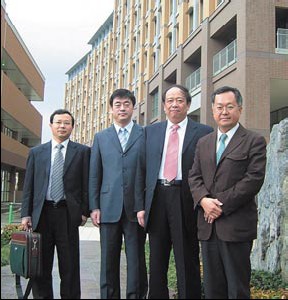 |
"As soon as I arrived at this campus, it brought back memories of my student days. I went to the classroom of the Department of Physics, where I had previously studied, and I observed grad students studying."
On April 3, 2006, President SHI Ningzhong, Kyushu University Alumni Association in China, and President of Northeast Normal University of China, visited Kyushu University.
It was President SHI's first visit to the Hakozaki Campus since graduating seventeen years ago from the Faculty of Sciences in 1989. He was informed that the number of Chinese Students at Kyushu University was 500. "When I was studying here at the Department of Physics in 1982, we only had a small number of Chinese students. Our close associates enjoyed making jiao-zi once a month," he recalled.
President Shi had talks with President Kajiyama regarding support for the Beijing Office, which opened in April and is planning to hold an opening event in July, and on an exchange development between Kyushu University and the Northeast Normal University of China.
On the following day, April 4, he requested a tour of the Ito Campus. After the tour, he attended a meeting with Mr.Shibata, Vice President of Kyushu University and Coordinator of the Alumni Association, and Mr. Shiota, Manager of the General Affairs Division, and discussed the issue of activities of the Alumni Association in China.
Himalayan Cherry Trees Planted at the Ito Campus
The Ito Campus, which opened in October last year, offers space where not only students and university staff but also local residents can appreciate nature. The campus strives to be environmentally friendly and to consider the surrounding ecosystem.
With the assistance of the "Cooperation Committee to Commemorate the 50th Anniversary of Japan-Nepal Diplomatic Relations," Himalayan cherry trees were planted at the Ito Campus so that people can enjoy viewing Japanese cherry blossoms in spring and Himalayan cherry blossoms in autumn.
On September 26, 2006, young 10 Himalayan cherry trees, as tall as one meter, were planted in a ceremony. More than 50 people attended the ceremony, including Yuki Ito, chief representative of the "Japan-Nepal Cooperation Committee for the 50th Anniversary of the Establishment of Bilateral Diplomatic Relations," Shigeko Mieno, president of the "Association of Education Fund for Children in Asia and Women," and Tisato Kajiyama, president of Kyushu University.
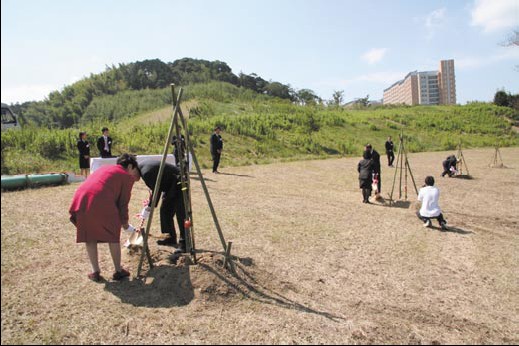 |
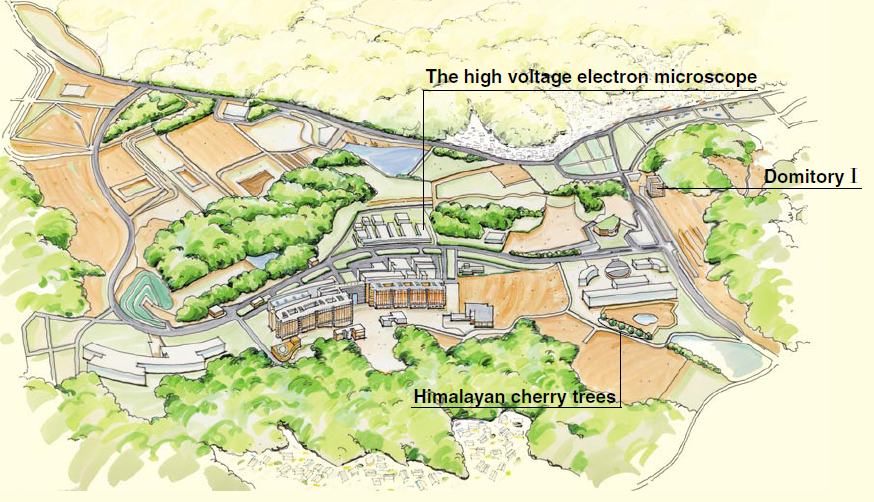 |
World's First Sub-Light Speed Electron Prism Installed on Ito Campus
The high voltage electron microscope installed on the Ito Campus of Kyushu University has the world's highest penetrating power, magnifying power, and resolution power. Furthermore, new functions have been added, targeting more accurate analyses of substances from multiple viewpoints.
Recently Kyushu University, with JEOL Ltd., has jointly developed an electron energy loss spectrometer, equipped with unique functions, and incorporated this system into the high voltage electron microscope. This electron energy loss spectrometer can separate electrons according to velocity and is very useful for identifying elements and studying the bonding state of atoms. The incorporation of an electron energy loss spectrometer into a high voltage electron microscope represents a world first. The electron energy loss spectrometer is composed of four electrical magnets of a sector shape, via which the direction of the electrons is deflected so that the electrons are separated according to velocity. This phenomenon is similar to that of a rainbow, which is generated when sunbeams are dispersed into seven colors by raindrops.
To install the electron energy loss spectrometer, the high voltage electron microscope was disassembled, and the system was installed between the intermediate and projector lens. After the installation, the height of the electron microscope increased by 1 m and the weight increased by 1 ton.
The expectation is that the renovated electron microscope will play an active role in a wide range of nanotechnology related fields such as the creation of substances, development of new energy, reduction of global environmental burdens, and medicine and biotechnology. The maximum acceleration voltage of 1.3 million volts, the maximum magnification ratio of 1.2 million, and the resolution power of 0.12 nm have remained unchanged following the installation of the electron energy loss spectrometer. This innovation enables identification of elements on a nanoscale and analyses of the bonding state of atoms and electron orbits as well as the direct observation of atomic arrangements. Furthermore, computed tomography (CT), which is the analysis of three-dimensional configurations of substances, can be implemented with the electron microscope.
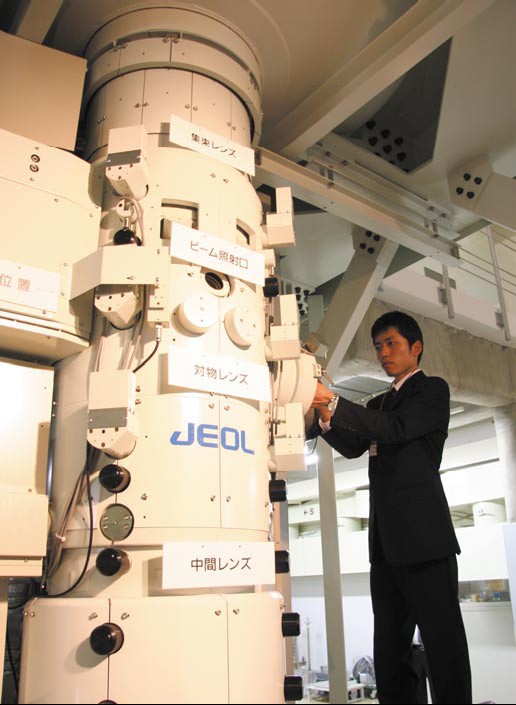 |
Dormitory at the Ito Campus
On Friday, September 22, 2006, the opening ceremony for the student dormitory at the Ito Campus was held.
Dormitory I is a 10-story building with 28 rooms on each floor. The second to seventh floors are for male students; the eighth floor, called Yazuya Floor, is for international students; and the ninth and 10th floors are for female students. A 13 square-meter room has a mini-kitchen, a bed, a unit bath, a desk, a bookshelf, an air-conditioner and a balcony. The rent, including common service charges, is 23,000 yen.
President Kajiyama said, "I hope this dormitory and campus will serve as a place where international students can communicate freely with Japanese students so when they return home, international students will have enjoyed their time studying at Kyushu University."
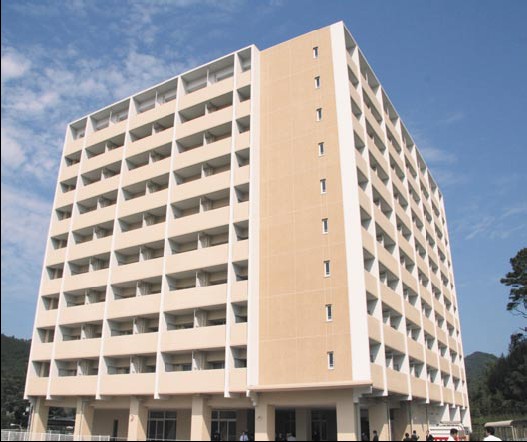 |